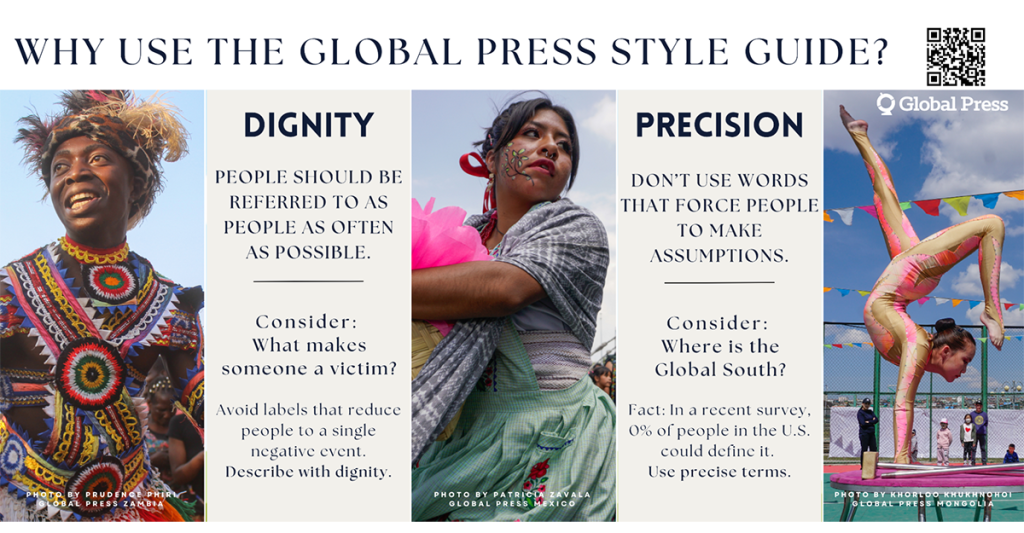
Describing people with dignity
Imprecise terms promote bias and oversimplify complex topics that readers need and deserve to understand
We are currently building and will soon debut a Chrome extension to help users make style guides accessible at the click of a button. We are building the prototype to help instantly identify imprecise language and aim for dignified descriptions according to the Global Press Style Guide.
You can help us ensure our extension design meets your needs: Please take this short survey.
The dangers of imprecise language
Last month, I attended ComNet’23 in Atlanta, where Global Press was selected to be a Showcase presenter. ComNet is put on by The Communications Network, where nonprofits and foundations working on “communications for good” gather to share ideas to maximize mission and impact.
We asked two provocative questions that get to the heart of why we feel our style guide is so important.
Question 1: What makes someone a “victim?“
The Global Press Style Guide prescribes specific word choices to ensure people are described with dignity. Each of the guide’s three core principles emphasizes the need for dignified representation that allows people to recognize themselves in stories. In particular, principle #2 of the Global Press Style Guide says simply: People should be referred to as people as often as possible. This guiding principle eliminates the need for labels that distill a person’s complex identity down to a single identifying label — like “victim” or “survivor.”
Why do we eschew labels at Global Press? According to Cristi Hegranes, Global Press’ Founder and CEO, “There are two kinds of labels — action-based and identity-based. Journalists must actively consider when it is appropriate and precise for a source to take a label. Of course, sometimes it is most economical to simply refer to people waiting in line to vote as ‘voters,’ that’s action-based. But when we find ourselves resorting to words like victim or survivor, we have to avoid those labels that distill a person’s humanity down to a single event or something that happened to them.”
The fix, Hegranes says, is to use strong verb phrases, such as someone who crossed the border without legal documentation or someone who walked with a cane after being in a car accident.
Question 2: Where is the “Global South?“
In March, Global Press published the results of its year-long audience research in partnership with Goodwin Simon Strategic Research. The report, Unlocking U.S. Audience Demand for International News, was published in partnership with Media Impact Funders.
Among the many important findings, our nationwide audience survey and focus groups revealed that 0% of U.S.-based readers could correctly define the term “global south.” So why do journalists continue to use this imprecise term that is little more than a sanitized synonym for poverty? Principle #1 of the Global Press Style Guide implores users not to use words that force people to make assumptions.
“Readers benefit from the use of precise terms”, says Hegranes. “We know that word choices reinforce world view. Globally, words like ‘terrorist’ or ‘rebel’ are often used with the presumption that they mean the same thing to everyone, but they don’t. These imprecise terms promote bias and oversimplify complex topics that readers need and deserve to understand.”
